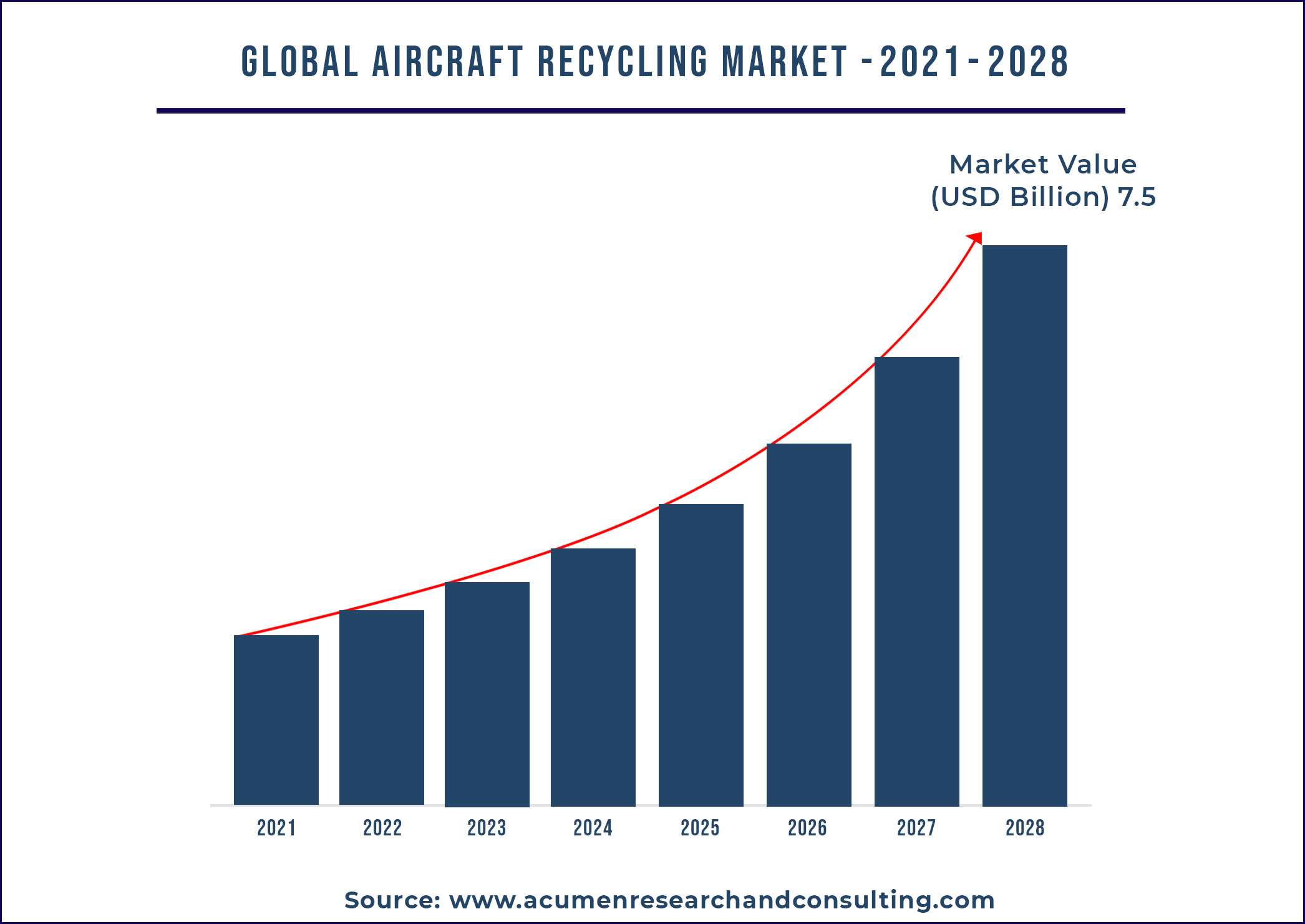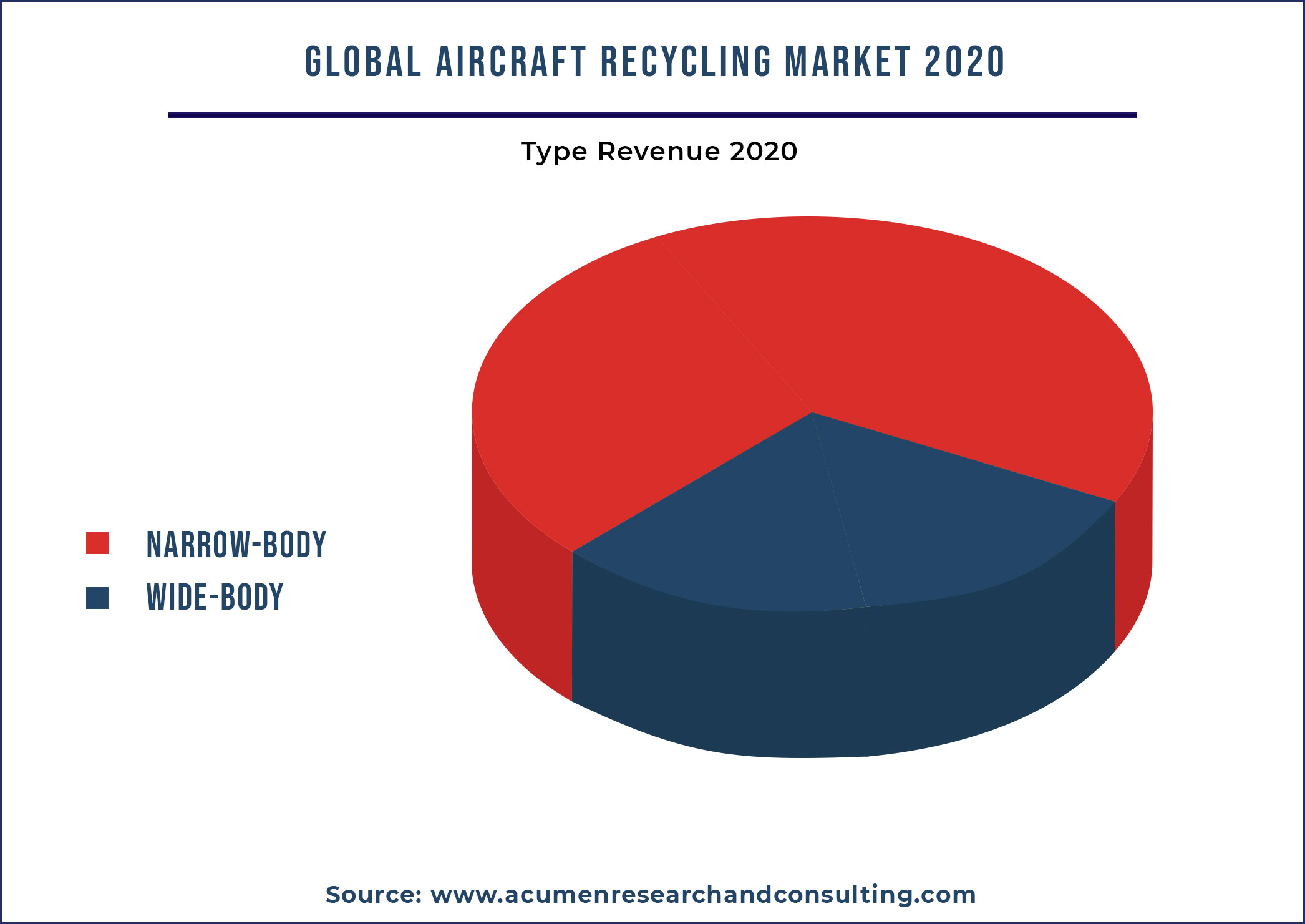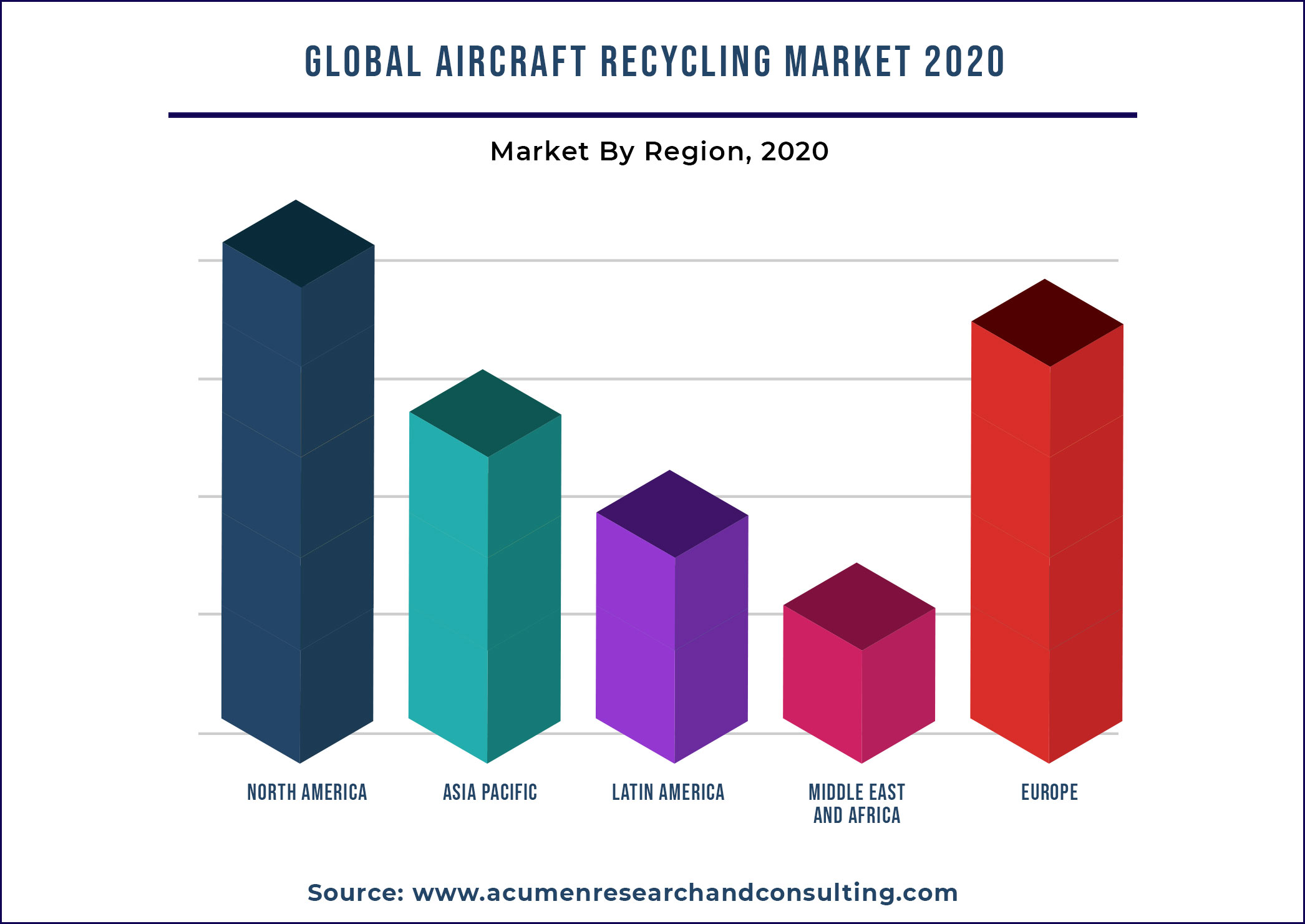Aircraft Recycling Market | Acumen Research and Consulting
Aircraft Recycling Market (By Aircraft: Narrow-body, Wide-body; By Product: Component, Material) - Global Industry Analysis, Market Size, Opportunities and Forecast 2021 - 2028
Published :
Report ID:
Pages :
Format : ![]()
The global aircraft recycling market is expected to grow at a CAGR of around 9.0% from 2021 to 2028 and expected to reach the market value of around US$ 7.5 Bn by 2028.

A typical plane will fly for approximately 20 to 25 years before being retired. The retirement of a plane for commercial use does not imply that its components have lost value. This is where aircraft recycling comes in to save the parts and materials. According to the Aircraft Fleet Recycling Association (AFRA), up to 12,000 aircraft could be scrapped over the next 20 years. It aims to perfect processes that will recycle 90% of an aircraft by 2016.
Report coverage
| Market | Aircraft Recycling Market |
| Analysis Period | 2017 - 2028 |
| Base Year | 2020 |
| Forecast Data | 2021 - 2028 |
| Segments Covered | By Aircraft, By Product, and By Region |
| Regional Scope | North America, Europe, Asia Pacific, Latin America, and Middle East & Africa |
| Key Companies Profiled | Aircraft End-of-Life Solutions (AELS), Aircraft Part Out Company (APOC), AIR SALVAGE INTERNATIONAL LTD, Aviation International Recycling, Tarmac Aerosave, Total Technic Ltd., ComAv - Commercial Aviation Services, and among others |
| Report Coverage |
Market Trends, Drivers, Restraints, Competitive Analysis, Player Profiling, Regulation Analysis |
| Customization Scope | 10 hrs of free customization and expert consultation |
Market Drivers
Sustainable recycling of aircraft components is the future of industry
According to the Air Transport Action Group (ATAG) report, the majority of the materials used in aircraft components, particularly in the fuselage, are manufactured from sophisticated alloys that necessitate a costly manufacturing process, often involving more difficult-to-obtain elements, resulting in recycling these materials becoming important and the actual recycling process having a significant impact on overall sustainability. Rather than separating out the various materials and alloys containing the panel, the traditional method is to simply recycle the materials collectively. This method is far less efficient, resulting in the processing of lower-value metals. Currently, a new initiative under the Clean Sky Program called the "European SENTRY Project" is working to change this process, allowing the materials to be re-used for their original purpose, which is to manufacture aircraft. This advanced recycling process will undoubtedly improve the overall sustainability of the aviation industry and eliminate the wasteful loss of these valuable materials from aviation.
Green practices bolster the growth of global aircraft recycling market
Green aviation is one of the most significant contributors to global carbon emissions, and the aviation industry is well aware of its responsibilities in terms of mitigating the effects of carbon dioxide. Green aviation is an umbrella term for sustainable practises in aerospace that include increasing fuel efficiency through engineering, developing biofuels, and offering innovations through aircraft recycling, Carbon Offsetting and Reduction Scheme for International Aviation (CORSIA), and additive manufacturing. The international community is working hard to adopt more environmentally friendly practices. For example, in 2005, Airbus launched "PAMELA," project to established itself as a leader in the field of aircraft recycling. The aimed to recycle 85 percent of each aircraft's components could be safely and effectively recovered, recycled, and reused compared to only 60 percent prior to the project's inception. Such factors, combined with a strong support for green practices, will fuel the growth of the global aircraft recycling market.
Favorable government regulations stimulate the growth of global aircraft recycling market
According to the EEPCINDIA report, while custom laws in India allow free import and export of leased aircraft, there is no such regulation for dismantled parts. However, the Reserve Bank of India (RBI) has currently resolved this issue by offering a solution by exporting leased helicopters, aircraft, engines, and other parts-in complete or knocked-down condition. This minor change benefits India's start-up industry by making it a hub where retired aircraft are restored and make it reusable. One such significant change creates new opportunities for the maintenance, repair, and overhaul industry, thereby having a positive impact on the global aircraft recycling market's growth.
Market Segmentation
The global aircraft recycling market is segmented based on aircraft and product. By aircraft, the market is classified into narrow-body and wide-body. By product, the market is bifurcated into components and materials. By component, the market is further segmented as engines, landing gear, avionics, and others. By material, the market is sub segmented as aluminum, other metals & alloys, and other materials.

Based on aircraft, narrow-body aircraft are expected to dominate the global aircraft recycling market and will continue to do so throughout the forecast period. Currently, low-cost carriers around the world rely on narrow body aircraft fleets (and often the smaller aircraft in that group), providing some evidence that small aircraft are more fuel efficient, and thus cost effective, than large aircraft. Such factors contribute to segmental growth, which in turn contributes to market growth overall.
In terms of product, the engine segment will provide profitable opportunities for the overall market in the coming years. According to the ATAG report, aircraft engine manufacturer Rolls-Royce has designed a recycling program that is now in operation at over 100 locations worldwide to recover and recycle exotic materials. Previously, the company developed new processes for removing coatings, separating alloys, and cleaning waste metal. Unusable engine parts and waste metal from titanium machining are recovered and reused. Almost half of a used engine can now be recycled, and the quality of the recovered material is now high enough that the metals can be safely reused in the development of new engines. Furthermore, the end result is a reduction in the need for raw materials and a measurable reduction in the environmental impact of the manufacturing process. Such factors are to blame for the overall dominance of the aircraft recycling market.
Regional Landscape
North America holds dominating share for aircraft recycling market
North America accounted for a sizable share of aircraft recycling in 2020 and is expected to maintain this trend throughout the forecast period. Among North American provinces, the United States is constructing one of the world's largest aircraft recycling hubs. The expansion will result in a large number of new jobs for Aircraft Solutions. The United States invests nearly $100 Mn in its new aircraft recycling facility.

The new facility opened in the summer of 2020 and will be fully operational in the fall of 2021. Such factors will undoubtedly have a positive impact on regional growth, ultimately contributing to the overall growth of the aircraft recycling market.
Competitive Landscape
The prominent players of the global aircraft recycling market involve Aircraft End-of-Life Solutions (AELS), Aircraft Part Out Company (APOC), AIR SALVAGE INTERNATIONAL LTD, Aviation International Recycling, Tarmac Aerosave, Total Technic Ltd., ComAv - Commercial Aviation Services, and among others
Market Segmentation
Market By Aircraft
Narrow-body
Wide-body
Market By Product
Component
• Engines
• Landing Gear
• Avionics
• Others
Material
• Aluminum
• Other metals & alloys
• Other materials
Market By Geography
North America
• U.S.
• Canada
Europe
• U.K.
• Germany
• France
• Spain
• Rest of Europe
Asia-Pacific
• China
• Japan
• India
• Australia
• South Korea
• Rest of Asia-Pacific
Latin America
• Brazil
• Mexico
• Rest of Latin America
Middle East & Africa
• GCC
• South Africa
• Rest of Middle East & Africa
Frequently Asked Questions
What will be the market value of the aircraft recycling market?
Aircraft recycling market is expected to reach a market value of around US$ 7.5 Bn by 2028.
At what CAGR, the aircraft recycling market is expected to grow during the forecast period (2021-2028)?
The aircraft recycling market is expected to grow at a CAGR of around 9.0% from 2021 to 2028.
Which is the leading segment in the aircraft recycling market?
Based on product, engines segment is the leading segment in the overall market.
What are the key drivers of the aircraft recycling market?
Favorable government regulation is one of the prominent factors that drive the demand for aircraft recycling market.
Which are the prominent players in the aircraft recycling market?
Aircraft End-of-Life Solutions (AELS), Aircraft Part Out Company (APOC), AIR SALVAGE INTERNATIONAL LTD, Aviation International Recycling, Tarmac Aerosave, Total Technic Ltd., ComAv - Commercial Aviation Services, and among others.
Which region held the highest market share in the aircraft recycling market?
North America is anticipated to grab the highest market share in the regional market
Which region is expected to be the fastest growing market over the forecast period?
Asia Pacific is expected to be the fastest growing market in the forthcoming years


